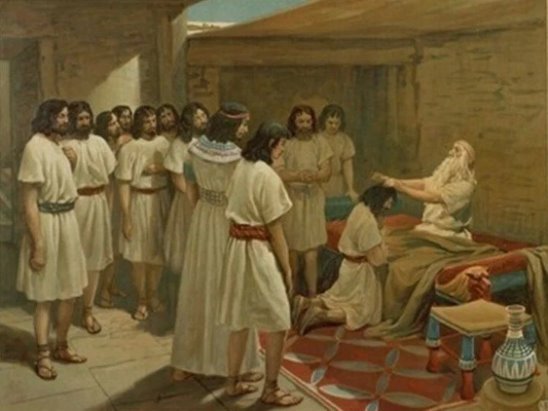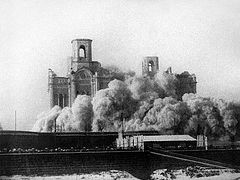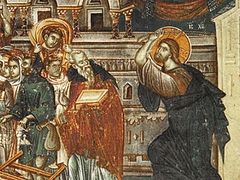Do you remember the names of Jacob’s sons? The firstborn was called Reuben, followed by Simeon, Levi was the third, Judah was the fourth, Joseph the Beautiful was the eleventh, and so on.
Which one of them was supposed to be the progenitor of the Messiah? Obviously, Reuben as the firstborn. But Reuben committed the gravest of sins—he defiled his father’s marriage bed by lying with his concubine Bilhah (Genesis 35:22), and this sin deprived him of his first-born right. Simeon and Levi, the second and third sons, committed a terrible massacre of the defenseless citizens of Shechem (Sichem) intending to avenge them for the violation of the honor of their sister Dinah, who had been raped in that city. Because of their barbarity, they too lost the right to become the progenitors of Christ.
The right to continue the sacred lineage from Abraham to Jesus Christ had passed to Judah, Jacob’s fourth son
Thus, the right to continue the holy lineage from Abraham to Jesus Christ went to Jacob’s fourth son, Judah. It was the Tribe of Judah that the Lord would preserve and bring back from the Babylonian captivity. Therefore, after the Babylonian captivity, the Hebrews will also be known as Judeans (other versions of this name are the Arabic “al-Yahud”, the English “Jews”, and the word “yid,” which has now acquired a specifically negative connotation), since most of the post-captivity Jews were from the Tribe of Judah. And so, our Lord Jesus Christ Himself would become that Lion from the tribe of Judah (Rev. 5:5), Whom Jacob-Israel prophetically proclaimed to his sons on his deathbed in Egypt.
So, it’s the year 1859 BC, Egypt, the city of Avaris in the Nile Delta, where Jacob-Israel, at the age of one hundred and forty seven, is ready to meet death... His eleven sons, the forefathers of the eleven tribes of Israel (Jacob had already seen off his favorite son Joseph), come to him to receive his final blessing.
Reuben, the first to approach his father, kneels down and leans his face against the edge of the bed. This is the same Reuben who committed the abomination, having sinned with his father’s concubine.
Reuben, thou art my firstborn, struggling to move his lips, Jacob addresses him. You are my might, and the beginning of my strength, the excellency of dignity, and the excellency of power: Unstable as water, thou shalt not excel; because thou wentest up to thy father’s bed; then defiledst thou it: he went up to my couch (Genesis 49:3–4).
Reuben rises from his knees in confusion and withdraws. The fate of his descendants is sealed.
“Previously, in his blessing to Reuben’s tribe (Deut. 33:6), Moses prayerfully wished for only one thing—that the tribe would not die... In subsequent times, the tribe of Reuben will be one of the first to pass out of history.”1
It is now Simeon and Levi’s turn to approach the dying man’s bed. They had always been together as children, together they had avenged the insulted honor of their younger sister, and so today, at the moment of their last conversation with their father, they came together to see him again. They knelt before him.
Simeon and Levi are brethren, Jacob addresses them under his breath, instruments of cruelty are in their habitations. O my soul, come not thou into their secret; unto their assembly, mine honour, be not thou united: for in their anger they slew a man, and in their selfwill they digged down a wall. Cursed be their anger, for it was fierce; and their wrath, for it was cruel: I will divide them in Jacob, and scatter them in Israel (Gen. 49:5–7).
Naturally, that’s exactly what happened later.
“The prophecy was fulfilled to the letter in both tribes, though not in the same way,” A. Lopukhin comments, “and only in the Tribe of Simeon with all its unfavorable significance. It quickly decreased in size during the forty years of wandering in the desert... It received an inheritance in Canaan, not for itself, but as part of the Tribe of Judah (Nab. 19; 1, 9). Its insignificance in public life is also evident from the fact that it has not been mentioned at all in the blessing of Moses (Deut. 33).
The patriarch’s dreadful prophecy about the Tribe of Levi also came true at first: it did not receive its own inheritance at the time of the partition of Canaan <...> But later, the sincere and zealous service to God of the representatives of this tribe <...> made it a privileged and sacred tribe of the servants of Jehovah in His temple: then, the curse of scattering was turned into the blessing of sacred ministry—preaching and worship ... among Israel (Deut. 32:9-11).” 2
Now it was the turn of the fourth son, Judah, to come for the blessing. Jacob looks at his son ... and suddenly the walls of the tent and the entrance curtain as if swayed before his clouded eyes... Gathering his last strength, Israel rises on his bed and, extending his hand in blessing, exclaims:
Judah, thou art he whom thy brethren shall praise: thy hand shall be in the neck of thine enemies; thy father’s children shall bow down before thee. Judah is a lion’s whelp: from the prey, my son, thou art gone up: he stooped down, he couched as a lion, and as an old lion; who shall rouse him up (Gen. 49:8–9)... He binds to his ass’s vine and to the vine of the best grapes his donkey’s son; he washes his clothes in wine and in the blood of bunches his garments; his eyes shine with wine, and his teeth are white with milk (Gen. 49:11–12).
Israel clearly sees the One of whom God spoke in the First Book of Moses (Gen. 3:15)—the Savior of the world, the King Messiah! The Davidic King, greeted by the rejoicing crowd, enters Jerusalem on a donkey…
The Davidic King, greeted by the rejoicing crowd, enters Jerusalem on a donkey...
Jacob sees: There, on a mountain overlooking an abandoned quarry just outside the walls of Jerusalem, a young Lion from the Tribe of Judah stretches out His arms on the Cross... Here, His disciples take down His most pure body from the Cross, wash with water, and wrap in a shroud... The women tearfully anoint Him with fragrant spices... The Body of the Tortured One is carried into the tomb to be laid on the bed cut out inside a limestone cave on the terrace of the quarry; He is buried and a heavy stone is rolled in front of the tomb...
He stooped down, he couched as a lion, and as an old lion; who shall rouse him up? (Gen. 49:9), elderly Jacob whispers sorrowfully. Who else, if not the Most High Himself, can now resurrect His Son?
From this moment on, let’s skip the blessings and prophecies about the other sons of Israel. We will only turn our attention to another son of Jacob from among the twelve, named Dan.
The Scriptures tell us nothing bad about Dan. But, looking at the sad and solemn face of his son, Jacob-Israel prophetically foresees in his descendants a man of perdition, the Antichrist, destined to come in the latter times of the history of mankind.
Dan shall be a serpent by the way, the elder chokes out as if in disbelief about the revelation just given him by God, an adder in the path, that biteth the horse heels, so that his rider shall fall backward... (Gen. 49:17).
The latter times in the history of mankind... In the king’s annex in the rebuilt temple in Jerusalem, the son of a harlot, the Antichrist, a shameless deceiver who performs great miracles, a Jew of the Tribe of Dan, mounts the throne. The Jews had initially declared him their Mashiach, but later, enlightened by the Prophet Elias, they recognized him as a usurper and a liar and rebel against God’s power. The enraged Antichrist gathers the rulers of the world and leads their hordes into the Holy Land to punish the Jews who rebel against him... The valley of Jesreel quakes with explosions and noise, the valley of Armageddon throbs with the cries of the wounded...
Jacob again rests his gray head on the pillow. Exhausted, he whispers:
I have waited for thy salvation, O Lord (Gen. 49:18).





